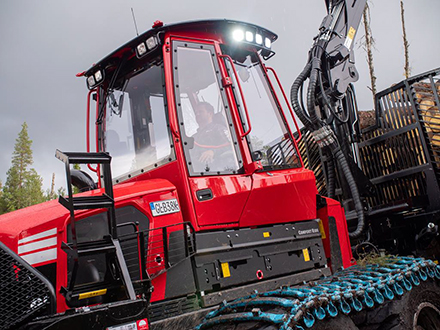A forwarder operator spends many hours a day in the cab, making a pleasant and comfortable work environment is extremely important. Forest terrain is often rough, and the operator is subjected to jolts and vibrations. Source: Timberbiz
These can be tiring and make maintaining a steady and high production rate a challenge and in the long run they can even affect your body physically, so Komatsu Forest is introducing the next generation of Komatsu Comfort Ride, with several comfort-enhancing innovations.
Komatsu Forest first launched the Komatsu Comfort Ride forwarder option back in 2013, a hydraulic cab suspension system with a four-point design that efficiently dampens jolts and vibrations.
“Comfort Ride quickly became one of the most popular options for Komatsu forwarders and now it’s time to introduce the next generation of Comfort Ride, with several eagerly awaited features,” says Daniel Grabbe Product Manager Forwarders at Komatsu Forest.
One new feature is the ability to adjust the cab suspension’s lateral firmness, which further improves operator comfort. This function is geared to the machine’s speed to make driving as comfortable as possible regardless of whether the operator is inching over an off-road obstacle or driving unladen from the landing to the next wood pile. In practical terms, the suspension’s firmness is progressive, increasing with machine speed to ensure maximum comfort.
“Since operator preferences regarding optimal cab suspension in various situations differ, individual adjustments can be made for each operator and settings are automatically saved in MaxiXT,” Grabbe explains.
The operator can also easily adjust the firmness while driving, if necessary, to adapt the machine to varying ground conditions. The suspension’s firmness is adjusted using a button on the hand controller.
Another new feature is that the new Comfort Ride can level the cab laterally on gradients of up to six degrees, provided the machine is stationary or moving slowly. This offers the operator a more comfortable working posture during crane operation, which usually is a fair share of their working day. When the machine is moving at higher speeds, the longitudinal suspension is given priority to better handle rough terrain.
When unloading, a clear view of the load area is advantageous. Comfort Ride has long had an unloading mode that raises the cab the full stroke of the cylinders. This affords the operator a good overview of the load area and the landing. One of the updates in the new Comfort Ride is that this function now also works when the machine is moved at low speed. This allows the operator to reposition the machine at the landing while still retaining the elevated position. If, however, the speed increases, the cab is automatically lowered back down to its standard position.
In addition to these new features, Komatsu Comfort Ride retains the same popular characteristics as before. The hydraulic cab suspension dampens vibrations from the tracks to ensure a smooth, comfortable ride for the operator, just as it dampens any jolts during crane operation.
“Komatsu Comfort Ride quite simply offers forwarder operators a work environment that is physically more forgiving while the reduction in jolts and vibrations enables them to retain their focus and energy levels for longer,” Mr Grabbe said.






